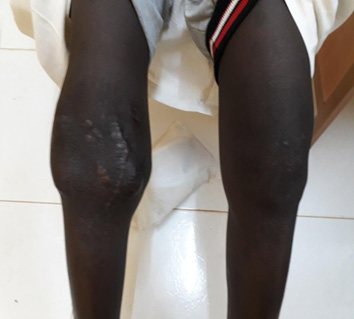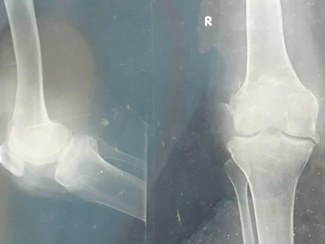ABSTRACT
Rheumatoid arthritis (RA) is an autoimmune multi-systemic inflammatory disease affecting joints result in dysfunction and ultimately damage, sero-negative RA has the clinical manifestations but negative diagnostic markers of RA. The aims from this study are to highlight and report an unusual presentation of sero-negative RA in young Sudanese patient. A 24 years old male presented with bilateral knees swelling progressed over the past two years with no association of pain and other joints not affected. Anti-CCP, RF, ANA, WBCs and viral screening were all inconclusive. Right knew X.ray and MRI along with synovial tissue biopsy indicated a diagnosis of Sero-negative RA. According to that patient received prednisolone, HCQ, methotrexate, folic acid and Osteocare, within less than 4 weeks the patient condition remarkably improved swelling subsided.
Keywords: Sero-Negative RA; Knees Swelling; Synovial Tissue Biopsy; Serology Markers
Abbreviations: ANA: Anti-Nuclear Antibodies; Anti CCP: Anti Cyclic Citrullinated Peptide; CRP: C Reactive Protein; HCQ: Hydroxychloroquine; RFT: Renal Function Test; LFT: Liver Function Test; ESR: Erythrocyte Sedimentation Rate; NSAID: Non-Steroidal Anti-Inflammatory Drugs; RBCs: Red Blood Cells; WBC: White Blood Cell count
Introduction
Rheumatoid arthritis has widely been known as a highly heterogeneous disorder of Immune dys-regulation [1,2], Rheumatoid factor (RF) is an autoantibody, and is been used in the diagnosis of rheumatoid arthritis for years, recently, Anti-cyclic citrullinated peptide antibody (ACPA) has gained more attention, as a valuable and significant marker in predicting and diagnosing of RA [3]. Both RF and ACPA have the same sensitivity, however, ACPA much more specific in the diagnosis of RA [4]. Nowadays, seronegative RA has become a moving target, reflecting both new modification in RA categorization [5], and an evolving understanding of diseasesantibodies association [5]. The proportion of the RA patients which is reportedly sero-negative for both ACPA and RF ranges between 0.1-0.48 [6]. ACPA and RF have been recognized as poor prognostic markers of RA, and both are used evidence to justify the use of intensive therapy in seropositive RA patients (SPRA) [7]. The report aims to draw attention to unusual presentation of RA in a young sero-negative patient.
Case Presentation
A 24 years old male from South Sudan has been referred to our clinic from the orthopedics department complaining of bilateral knees swelling for two years (Figure 1). His condition started with progressive painless right knee swelling over several months then the left knee was affected similarly. There was no associated pain, redness or hotness, the swelling mildly affects his movement, other joints were not affected, there was no back pain nor morning stiffness, no fever, loss of weight or other constitutional symptoms. Other systems were unremarkable. Musculoskeletal examination shows both knees were swollen with effusion with slight hotness with no tenderness, deformity or restriction of movements. Other joints were normal including the back without any muscles weakness nor tenderness. There are no scalp, skin or nail changes. On general examination the patient looks well, afebrile, average weight, not pale. Normal pulse and blood pressure. The patient has no history of diabetic, hypertensive or any bleeding tendency. he has no history of trauma and or any family history of rheumatic disease or similar conditions. General works up is done and shows normal complete blood count. [Blood hemoglobin (13.8g/dl)( normal value 13.5 to 17.5g/dl), MCV 75 fl, MCH (28.2pg), MCHC (37.5g/dl), WCC (6.900)( Normal value: 4,000 and 11,000 per microliter of blood), platelet: 399,000 (Normal value 50,000 to 450,000 platelets per microliter of blood). ESR is 100 (Normal value: between 0 and 15 mm/hour), RFT and LFT were both normal, Urine analysis was also clear, viral screening is negative, rheumatoid factor (RF) and ACCP were also unremarkable, ANA profile is negative. Chest X-ray done and also normal. Right knew X-ray (Figure 2) and MRI along with synovial biopsy indicate the diagnosis of rheumatoid arthritis. Microscopic evaluation of synovial tissue inflammation shows marked cellular hyperplasia in the lining layer, T-cells, plasma cells, Macrophages, B-cells, neutrophils, mast cells, NK cells and dendritic cells accumulate in the synovial sub lining layer. The patient received prednisolone 20mg, hydroxychloroquine (HCQ) 200mg twice daily, methotrexate 15mg weekly, folic acid 5mg twice weekly and osteocare once daily. One month later the patient frankly improved and swelling subsided, ESR was 5mm/hr.
Discussion
RA is usually diagnosed based on the classification of the American college of rheumatology [5]. According to the classification, A score of more or six is usually indicating RA, the classification includes features like Involved joint type, duration and serology markers such as CRP, ESR, RF and anti-CCP. When the patient still exhibit symptoms and signs of RA but his serological markers are negative this is an indication of seronegative rheumatoid arthritis. RA has long been recognized as an extremely heterogeneous disorder of immune dys-regulation. Despite an ever-growing appreciation of the role of circulating autoantibodies in the progress of ‘seropositive’ disease, the pathogenesis of sero-negative RA remains poorly understood [1]. The clinical presentation and scenario of this case can fit with many diagnoses such as undifferentiated arthritis which is an overlap syndrome with RA and not fit well known clinical disease categories ( e.g, reactive arthritis and sero-negative RA) [8,9]. Although, synovial knee biopsy confirmed the diagnosis. other possible diagnosis overlaps with this patient condition include reactive arthritis, but the absence of infection exclude the diagnosis as the swelling and joint pain in reactive arthritis mainly triggered by infection [10]. Psoriatic arthritis includes similar clinical features such as joints pain and stiffness and the diagnosis is primarily based on the clinical phenotype due to the diversity of the associated features which include nail and skin disease, uveitis, dactylitis and osteitis [11]. And these skin manifestations were not presented in this case.
The synovial biopsy is not usually used for routine diagnostic or therapeutic purpose in RA patients [12]. However, synovial tissue examination can assist in the diagnosis of some joint infection. Although there is no diagnostic role in acute RA, although, synovial tissue analysis that can provide significant prognostic information, recent studies have shown that examined mediators of joint damage and synovial tissue inflammation were found to be linked with unfavorable radiological and clinical outcomes [13]. Although genetic variation has long been supposed to account for around 60% of RA risk [14], however recent reports indicates that this figure for heritability may be significantly lower in sero-negative RA [15]. It follows that environmental factors such as smoking should play a more essential role in seronegative RA, but much has yet to be understood in this area [16,17].
Practice Points
1) Sero-negative RA signifies an important disease burden, for which prompt therapeutic intervention remains to be vulnerable to diagnostic challenges.
2) Currently, there is inadequate evidence to support a modified treatment strategy for the seronegative RA, even though the value of initial combination DMARD use, and that of B-cell depletion therapy, may be less than in seropositive disease.
Conclusion
Seronegative RA is a chronic, painful condition, where the patient exhibit features of RA with unremarkable serological value, their triggers and the extent to which they overlap or differ according to autoantibody status will define our ability to manage RA more effectively. This is a case of a young Sudanese patient who is been suffers from knees swelling for two years.
Clinical Message
Rheumatoid arthritis is an autoimmune disease affecting the joints and lead to their damage. Seronegative RA is a chronic, painful condition, where the patient exhibit features of RA however have negative diagnostic markers of RA.
Conflict of Interest
None.
Written Consent from the Patient
Obtained.
Funding
No fund has been received.
Availability of Data and Materials
All the data used in the study are available from the first and corresponding author on reasonable request.
References
- Pratt AG, Isaacs JD (2014) Seronegative rheumatoid arthritis: pathogenetic and therapeutic aspects. Best practice & research Clinical rheumatology 28(4): 651-659.
- Adam Essa M, Taha Z, Idris Abdelhalim A, Ahmed Elamin Elnour M, Ali A, et al. (2021) A Sudanese Female Case with Rheumatoid Arthritis and Bronchiectasis as a Presentation and Low Vitamin D Level. Am J Arthritis 5(1): 1020.
- Whiting PF, Smidt N, Sterne JA, Harbord R, Burton A, et al. (2010) Systematic review: accuracy of anti–citrullinated peptide antibodies for diagnosing rheumatoid arthritis. Annals of internal medicine 152(7): 456-464.
- Finckh A, Liang MH (2007) Anti-Cyclic Citrullinated Peptide Antibodies in the Diagnosis of Rheumatoid Arthritis: Bayes Clears the Haze. Annals of internal medicine 146(11): 816-817.
- Aletaha D, Neogi T, Silman AJ, Funovits J, Felson DT, et al. (2010) 2010 Rheumatoid arthritis classification criteria: an American College of Rheumatology/European League Against Rheumatism collaborative initiative. Arthritis and rheumatism 62(9): 2569-2581.
- Raza K, Breese M, Nightingale P, Kumar K, Potter T, et al. (2005) Predictive value of antibodies to cyclic citrullinated peptide in patients with very early inflammatory arthritis. The Journal of rheumatology 32(2): 231-238.
- Smolen JS, Landewé R, Breedveld FC, Buch M, Burmester G, et al. (2014) Eular recommendations for the management of rheumatoid arthritis with synthetic and biological disease-modifying antirheumatic drugs: 2013 update. Annals of the rheumatic diseases 73(3): 492-509.
- Parida JR, Kumar S, Ahmed S, Chaurasia S, Mukherjee R, et al. (2020) Reactive arthritis and undifferentiated peripheral spondyloarthritis share human leucocyte antigen B27 subtypes and serum and synovial fluid cytokine profiles. Rheumatology 60(6): 3004-3011.
- IbnIdris Rodwan AA, Adam Essa ME, Abdalla Babker AE, Mohamed Abdelsatir A, Mohammed Elagib E (2022) Neutrophilic dermatoses in a seronegative rheumatoid arthritis patient: A case report. Clinical case reports 10(1): e05249.
- Wendling D, Prati C, Chouk M, Verhoeven F (2020) Reactive arthritis: treatment challenges and future perspectives. Current rheumatology reports 22(7): 1-7.
- Veale DJ, Fearon U (2018) The pathogenesis of psoriatic arthritis. Lancet 391(10136): 2273-2284.
- Fink B, Schuster P, Braun R, Tagtalianidou E, Schlumberger M (2020) The diagnostic value of routine preliminary biopsy in diagnosing late prosthetic joint infection after hip and knee arthroplasty. The bone & joint journal 102(3): 329-335.
- Cunnane G, Fitz Gerald O, Beeton C, Cawston TE, Bresnihan B (2001) Early joint erosions and serum levels of matrix metalloproteinase 1, matrix metalloproteinase 3, and tissue inhibitor of metalloproteinases 1 in rheumatoid arthritis. Arthritis & Rheumatism 44(10): 2263-2274.
- MacGregor AJ, Snieder H, Rigby AS, Koskenvuo M, Kaprio J, et al. (2000) Characterizing the quantitative genetic contribution to rheumatoid arthritis using data from twins. Arthritis & Rheumatism: Official Journal of the American College of Rheumatology 43(1): 30-37.
- Frisell T, Holmqvist M, Källberg H, Klareskog L, Alfredsson L, et al. (2013) Familial risks and heritability of rheumatoid arthritis: role of rheumatoid factor/anti–citrullinated protein antibody status, number and type of affected relatives, sex, and age. Arthritis & Rheumatism 65(11): 2773-2282.
- Källberg H, Padyukov L, Plenge RM, Rönnelid J, Gregersen PK, et al. (2007) Gene-gene and gene-environment interactions involving HLA-DRB1, PTPN22, and smoking in two subsets of rheumatoid arthritis. The American Journal of Human Genetics 80(5): 867-875.
- Abdelgalil Ali Ahmed S, Adam Essa ME, Ahmed AF, Elagib EM, Ahmed Eltahir NI, et al. (2021) Incidence and Clinical Pattern of Mixed Connective Tissue Disease in Sudanese Patients at Omdurman Military Hospital: Hospital-Based Study. Open access rheumatology: research and reviews 13: 333-341.

 Case Report
Case Report

